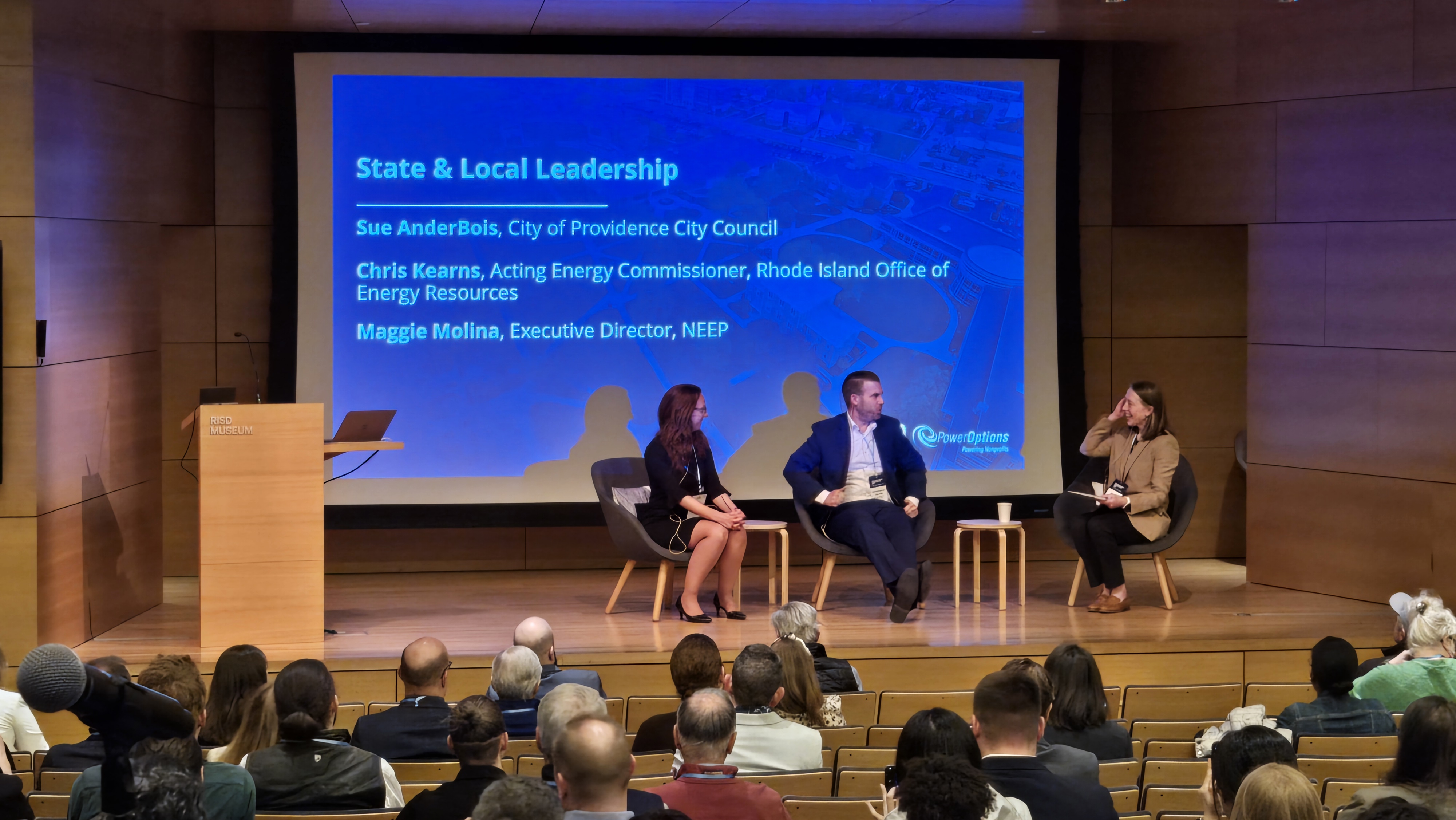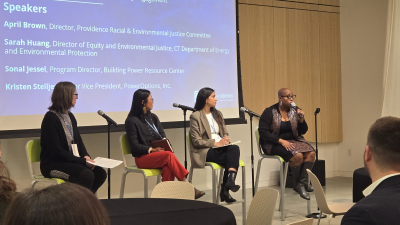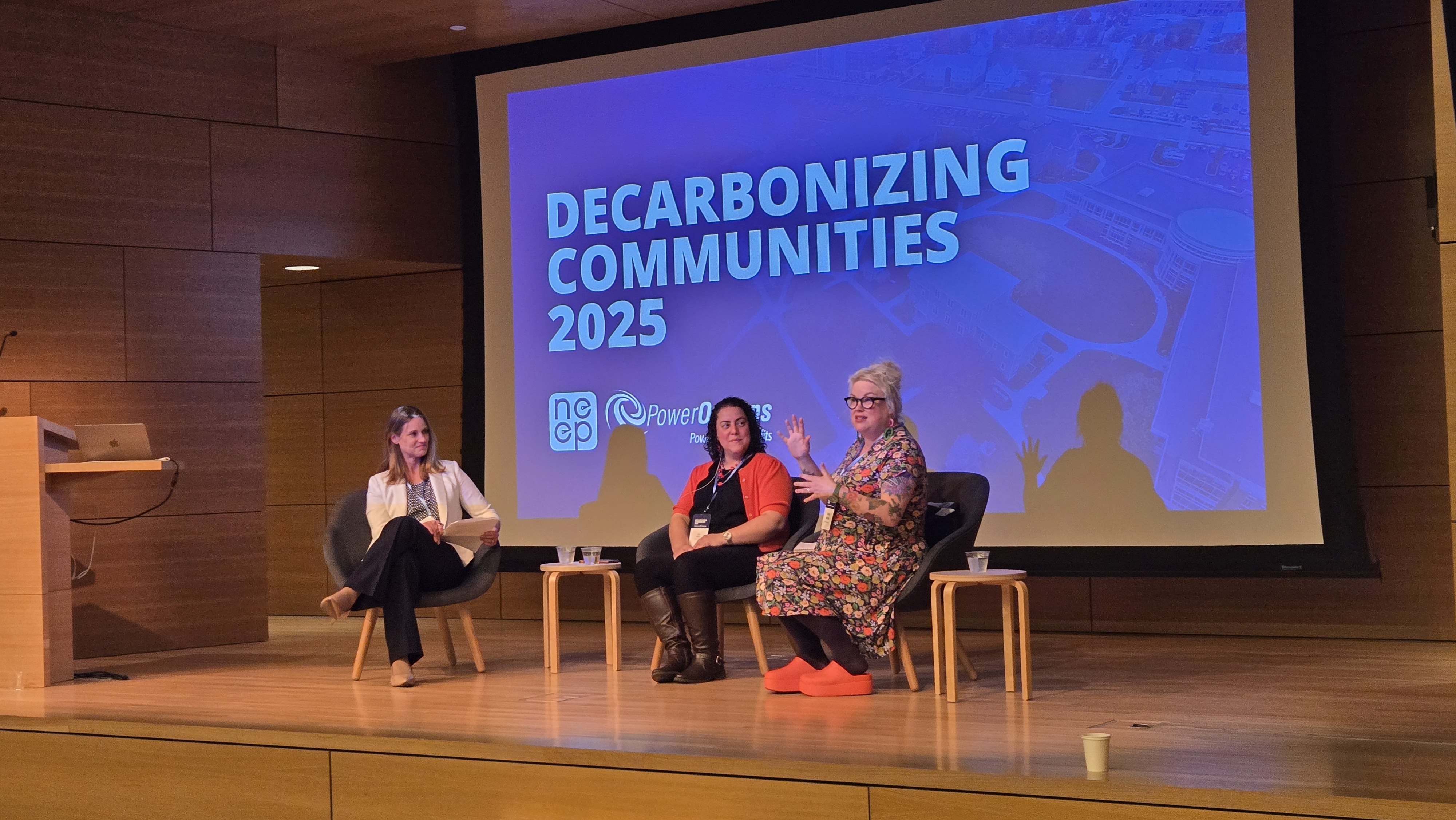

By Michael Anderson | Wed, May 28, 25
As communities across the Northeast and Mid-Atlantic seek energy efficiency as a pathway to an efficient, clean, and affordable energy future, the need for practical strategies and effective partnerships to create healthy, resilient, and affordable buildings and infrastructure has never been greater.
Advancing these efforts will require leadership from state and local governments; stronger partnerships among state agencies, utilities, and municipalities; proactive and authentic community engagement with special considerations for underserved communities; effective and replicable models to address needs like building retrofit financing and multifamily programs; and greater adoption of emergent technologies like networked geothermal heating and cooling.
The Decarbonizing Communities Workshop – co-hosted by NEEP and PowerOptions in April – was designed to highlight these growing priorities and bring together key partners to achieve meaningful solutions. The workshop kicked off with NEEP Executive Director Maggie Molina and PowerOptions CEO Heather Takle in discussion with Chris Kearns, the Acting Energy Commissioner with Rhode Island’s Office of Energy Resources and Providence City Councilor Sue AnderBois. This plenary session highlighted one recurring theme for the day; the need for strong, decisive leadership at the state, regional, and local levels, particularly amid growing challenges like ensuring energy affordability and federal funding uncertainty. The plenary discussion was characterized by a consistent tone of commitment, optimism, and resolve on the part of state and municipal leaders, perfectly setting the stage for the rest of the day.
Content Tracks Highlight Community Voices and Actionable Strategies
The workshop’s dual session tracks were designed to emphasize two complementary elements that are critical for advancing energy efficiency at the community level: programs that are inclusive and centered in community needs and actionable strategies that advance energy efficiency, promote energy affordability, and lead to long-term local economic benefits.
Authentic Engagement: The Foundation of Effective Energy Efficiency Programs
The day began with a powerful discussion on the importance of community buy-in for energy efficiency and community energy programs and real-world examples to demonstrate the value of authentic, accountable, transparent community engagement for effective program design and implementation, most especially in low- and moderate- income communities. Panelist April Brown, director of Providence’s REJC 401, was asked by an audience member for advice on finding the courage to take on the challenges that communities are currently facing. April’s simple yet powerful response resonated throughout the room, “Don’t be afraid.”
This exchange underscored an important theme: we must embrace courage and engage in proactive collaboration to ensure that energy efficiency programs reach and benefit all community members. Effective engagement means more than just outreach. It means listening, building trust, being accountable to stakeholders, and compensating community members and community-based organizations for their expertise on local opportunities and barriers. This is an approach that NEEP is embracing in initiatives like our Community Driven Transportation Planning for the Northeast project, where we are partnering with local organizations in three states in New England to center local expertise in clean transportation planning and set the stage for effective, inclusive, and durable programs in the future.
Geothermal as a Solution for Community Heating and Cooling
A discussion on geothermal heating and cooling workforce development highlighted the need to ensure communities realize long-term economic benefits and job creation. Workshop participants discussed the opportunities and challenges of accelerating the adoption of networked geothermal systems, including the need for inclusive and accessible workforce development programs, robust regional collaboration to overcome equipment and labor bottlenecks, and cross-sector partnerships to increase market penetration. These priorities reflect findings from NEEP’s recent assessment of the geothermal workforce in Connecticut, and underscore the need for continued research and regional collaboration to advance geothermal as a durable and proven solution for efficient heating and cooling.
Advancing Energy Efficiency through Municipal/Utility Partnerships
The workshop’s second session focused on two crucial aspects of energy efficiency and community decarbonization: financing and utility/municipal partnerships. The utility/municipal partnerships session saw panelists from regional utilities share lessons learned and best practices for collaboration, including the importance of early and sustained engagement, strategies for developing and maintaining strong partnerships, and how partnerships can streamline programs and drive uptake among hard-to-reach populations.
Innovative Financing Models for Multifamily, Rental, and Other Hard-to-Target Properties
In the financing session, panelists discussed Inclusive Utility Investments, how community development financial institutions can support project capitalization, and the role of green banks in funding energy efficiency programs, with a particular focus on how these tools can benefit hard-to-reach stakeholders like rental property landlords and tenants.
For the past six months, NEEP has partnered with ACEEE to facilitate a peer learning group for municipalities interested in rental property program development, and project funding has emerged as a key constraint to program deployment. Uncertainty around federal funding further highlights the importance of developing innovative financing models to fund building retrofits, particularly for hard-to-finance sectors like Naturally Occurring Affordable Housing (NOAH) multifamily properties. As NEEP has developed a strategy for addressing the regional multifamily sector over the past year, NOAH has emerged as an acute area of need across the region.
Collaborative Approaches Advance Energy Efficiency in the Multifamily Sector
For the workshop’s final sessions, panelists shared best practices for multifamily housing retrofits, and how different ownership structures and building typologies require tailored strategies. Program implementation in multifamily housing requires a nuanced approach to accommodate the different types of ownership models such as public, subsidized, or unsubsidized affordable housing.
Successful programs center resident needs by pairing health and safety improvements with energy efficiency upgrades. Another important theme of the multifamily session was the value of collaboration among housing authorities, property owners, state and municipal agencies, and utility programs, and how these partnerships can lead to more streamlined and efficient program implementation at affordable housing properties.
Stakeholder engagement was another area of focus for this session, with program implementors highlighting the value of authentic and sustained engagement with property owners and how this engagement drives energy efficiency program uptake.
The other final session discussed community-based solutions for access to renewable energy, including community solar initiatives, community resilience hubs, and Community Choice Aggregation (CCA) programs. Panelists stressed the need to promote energy affordability by expanding these initiatives through greater regional cooperation and the importance of ensuring programs are accessible and will provide benefits for underserved communities.
Inspiring Closing Plenary Urges Attendees to Stay Engaged and Work Together
As the day concluded, participants joined together in the RISD auditorium for the workshop’s closing plenary. After an information-packed day, the plenary attendees left inspired and energized as they returned to their own communities. Kate Felder, Rhode Island Energy’s Energy Efficiency Consumer Advocate, and Lina Bravo, the Coordinator for Digital Learning and Outreach at the Providence Public Library engaged in a rousing discussion that served as a real-time example of the value of collaboration among community-serving organizations, and how these partnerships can advance energy efficiency programs.
Rhode Island Energy and the Providence Public Library partner to promote RI’s energy efficiency programs, making it easy for local residents to access free home energy assessments and rebates for insulation and efficient appliances. By leveraging a trusted community hub like the library, Rhode Island Energy’s programs can increase participation and reach a broad and diverse audience. Felder summed up this work by invoking a community icon. “When Mr. Rogers was a little boy and he’d see scary things happening, his mother would say, ‘Look for the helpers. You will always find people who are helping.’ The good news is that we are right here - we can BE the helpers.” Kate’s call to action perfectly captured the dedication of the workshop attendees, the helpers committed to advancing community health and resilience through energy efficiency.
The Decarbonizing Communities 2025 workshop made one thing unmistakably clear: meaningful progress on community energy efficiency and decarbonization depends on technical solutions and innovative programs as well as a commitment to authentic, community-centered engagement and collaboration. From innovative financing strategies to utility/municipal partnerships, to multifamily retrofits, the workshop demonstrated how inclusive program design, innovative problem solving, and collaborative partnerships lead to better outcomes for all community members. As participants left with new knowledge, resources, and connections, the event closed not just with inspiration, but with a clear call to action: Stay engaged, share knowledge, and work together to build cleaner, healthier, and more resilient communities.



